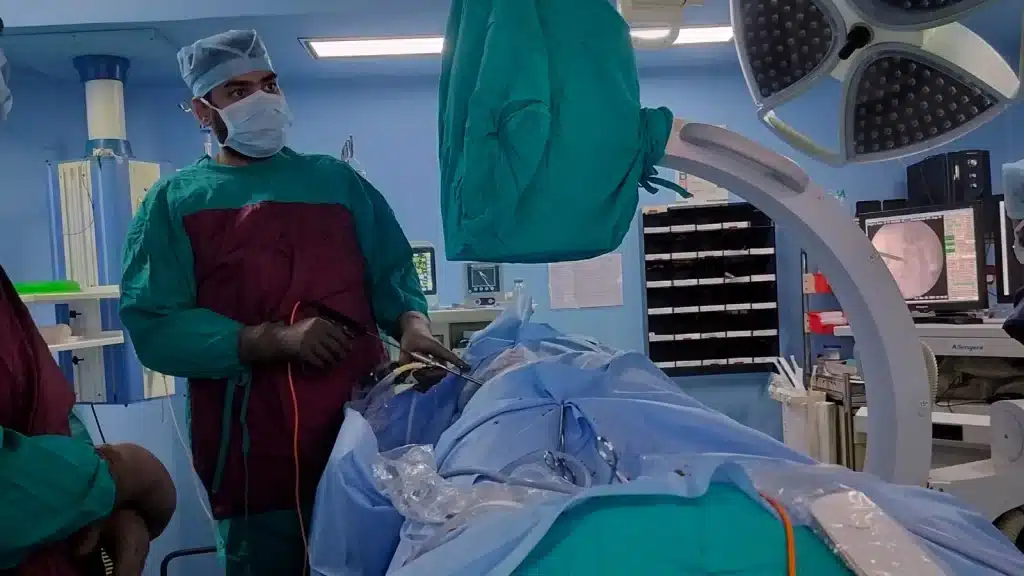Laparoscopic Ectopic Surgery
Ectopic pregnancy is a serious condition that requires immediate medical attention. At Sahaj Hospitals in Indore, our dedicated Laparoscopic Ectopic Surgery Department offers expert care and advanced treatment options to ensure the best outcomes for your health and fertility. With a team of highly skilled specialists and cutting-edge technology, we are committed to providing safe, effective, and compassionate care tailored to your needs.
If you suspect an ectopic pregnancy or are seeking expert care, Sahaj Hospitals in Indore is here to help. We offer advanced treatment options with a focus on safety and recovery. Schedule a consultation with our specialists today to receive the care you deserve.
Our Specialties

What Is an Ectopic Pregnancy?
An ectopic pregnancy occurs when a fertilized egg implants outside the uterus, most commonly in the fallopian tube. This condition, also known as a tubal pregnancy, can pose significant health risks if left untreated. The fallopian tubes are not equipped to support a developing pregnancy, and early intervention is critical to prevent complications such as internal bleeding or tubal rupture.
Causes and Risk Factors of Ectopic Pregnancy
While the exact cause of an ectopic pregnancy is often unclear, several factors can increase the risk, including:
- Previous pelvic infections or conditions like pelvic inflammatory disease (PID).
- Fallopian tube damage from surgery or past infections.
- Use of assisted reproductive technologies (ART) such as IVF.
- Smoking, which can impair tubal health.
- Structural abnormalities in the reproductive system.
- History of ectopic pregnancy or sexually transmitted infections like gonorrhea and chlamydia.
Women over the age of 35 and those with a history of pelvic surgeries, endometriosis, or multiple abortions may also have an increased risk.
If you experience symptoms such as sharp abdominal pain, abnormal vaginal bleeding, or dizziness during pregnancy, consult your doctor immediately. Early diagnosis and treatment are essential to avoid complications.
Symptoms and Diagnosis of Ectopic Pregnancy
At Sahaj Hospitals, we understand the urgency of diagnosing an ectopic pregnancy. Symptoms may include:
- Sharp, localized abdominal or pelvic pain.
- Light to heavy vaginal spotting.
- Dizziness, fainting, or signs of shock in severe cases.
- Referred pain in the shoulder or neck.
Our diagnostic approach includes:
- Transvaginal Ultrasound: This imaging technique allows us to check for the presence of a gestational sac in the uterus.
- Blood Tests: Measuring hormone levels (hCG and progesterone) helps confirm the diagnosis.
- Physical examinations to rule out other potential conditions.
In emergencies, such as a ruptured fallopian tube, immediate surgical intervention may be necessary.
Advanced Laparoscopic Treatment for Ectopic Pregnancy
At Sahaj Hospitals, we specialize in laparoscopic surgery, a minimally invasive procedure that offers precise treatment with shorter recovery times. Our team carefully evaluates each patient’s condition to recommend the most appropriate treatment plan, which may include:
- Medication: Methotrexate may be prescribed in certain cases to halt the growth of the ectopic pregnancy.
- Laparoscopic Salpingectomy or Salpingostomy:
- In a salpingectomy, the affected section of the fallopian tube is removed.
- A salpingostomy involves removing the pregnancy while preserving the tube, provided it is not severely damaged.
- Emergency Surgery: For ruptured ectopic pregnancies, an open abdominal procedure (laparotomy) may be performed to stop bleeding and repair or remove the affected tube.
Our specialists prioritize preserving your fertility whenever possible and ensuring your long-term reproductive health.
Future Fertility and Preventive Care
We understand that an ectopic pregnancy can be emotionally and physically challenging. While this condition affects future fertility, many women conceive successfully after treatment. As long as one healthy fallopian tube remains, natural conception is possible.
To reduce the risk of future ectopic pregnancies, we recommend:
- Quitting smoking, which can damage fallopian tubes.
- Practicing safe sex to avoid infections like PID.
- Regular gynecological check-ups to monitor reproductive health.
